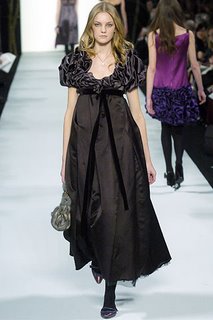Imitation and a Cultural Aesthetic

You make a good point, China; there are certainly cases that art is imitative. I guess that what I resist the idea that it is *always* imitative. That is, there are many times (take Van Gogh's renderings of his Room at Arles) when an artist will paint a craftsman's work but ask us to view it differently. So while it has the capacity to imitate, like you are talking about, it is not in essence imitative, for it will not always do so. It's a fine line.
Also, speaking about culture and art - I think it is really easy to see how our aesthetic sense is culturally conditioned in fashion. I would argue that some of the "high" fashion houses' clothes are art (they are creative, often provocative, often beautiful). Looking at how fashions change from season to season, year to year, and decade to decade can be incredibly revealing. Every ten years or so, there are a couple of collections that re-attune our aesthetic senses; the pattern is clear, as one issue of Vogue pointed out. A controversial new shape enters the fashion realm and people hate it at first. But, as time wears on, they begin to see its beauty and indeed emulate it. Take Marc Jacobs Fall 2005 collection (follow link). Called "lumpenly ugly" and full of "prom dresses for pregnant teenagers," it sold remarkably well and is already rippling through other collections. A collection like this overturns and reconditions our sense of the beautiful.
I just find it really interesting to watch fashion as a cultural register of sorts, because it is so visible and updates itself twice a year. More conventional forms of art take much longer to sort themselves out - books take years to write and more time to publish, paintings must make their ways into galleries and then people have to see them, but fashion is thrown at us in magazines, on tv, and in stores.

2 Comments:
Hey Sarah...try inserting the link using the command in the post editor. Highlight the word, click the hyperlink symbol, and paste the link.
We might be agreeing, China, but talking in different terms -
You say that "the artist cannot be entirely abstract," but I am not asking her to be. Art certainly imitates some parts of life, especially if you equate "imitate" and "reproduce" (which is what I *think* you are doing, though correct me if I am wrong). And of course we need previous structures, even as simple as line, word, or sound, to create art. But all art does not imitate these structures. It actively *engages* them. If it merely imitated them, all we would have was a hodge-podge of lines and words and sounds. There would be no conscious thought, no input if art were truly imitative. It imitates, but is not imitative. So I think that we are agreeing, but that we perhaps have different definitions of imitate.
My main quarrel is with the word "imitative." It is reductive and negative, implying that art can only reproduce (poorly) the structures and forms of life. I do not deny that art imitates certain forms (like line, word, sound etc.), but it works off of those. It is active, not passive, progressive, not regressive.
I would argue that what you are discussing with the case of the dress is not imitation. That is active engagement, to me, which is very different from imitative. Perhaps imitation of a form is a starting point, for, you are right, the fabric dress had to exist for the art to ensue. But that does not mean that the sculptor's work merely hollowly reproduces that dress. It works off of it. Were it to imitate the dress, it would sculpt an inevitably poorer representation of the dress with no creative thought. Like a photograph of art - art prints are, to me, imitative. They add nothing new. But because the sculptor adds something new, his work is not imitative. Rather, it re-visions the form of the dress. It may imitate it on some level, but it moves beyond that.
Does that make sense? I think that we are agreeing, but that I have a different (and much more negative) definition of "imitative." Let me know, and I am enjoying your responses!
Post a Comment
<< Home